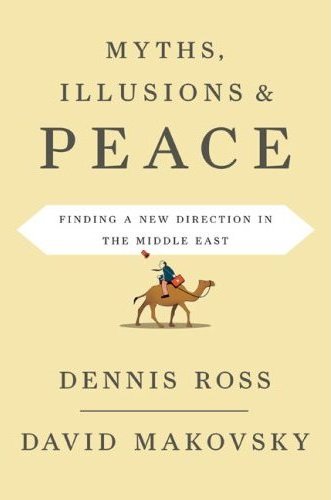
Dennis Ross and David Makovsky’s Myths, Illusions, and Peace: Finding a New Direction for America in the Middle East debunks popular and powerful misconceptions about the Middle East, and studies the long history of American attempts at peacekeeping in the region. “We feel America has been susceptible to some of these myths,” Makovsky said, “but we make a clear case for peacemaking. The U.S. needs to be engaged in the pursuit of peace.” Makovsky, a fellow at the Washington Insitute for Near East Policy, chatted with Zócalo about the assumptions that inform Middle East policy, and why they’re harmful.
Q. What led you and Mr. Ross to write this book?
A. We wrote the book because we felt that people were enthralled with grand theories. We thought the reality in the Middle East was more complex than these grand theories, and that led to certain distortions and myths in terms of American policy-making. We thought there was a need to kind of grapple with some of these ideas, of these two big political thought schools, and to show where we thought the problems were and to propose solutions. We did not want to just carp from the sidelines. We want to be helpful and be part of the solution.
Q. What are those schools of thought, and where do they go wrong?
A. We felt the realism school – defining American interests in the Middle East largely through focusing on oil and stability issues – missed the complexity of the Middle East. Their view was you could just impose peace because peace between Israel and Palestine is not central to American national interest, and therefore just needs to be imposed. The neoconservative school tends to not basically focused on the peace issue but more focused on democracy, and thought you could impose that. We felt you could not impose either. In each case whether the Arab-Israeli issue or the reform issue, these were longer processes that require clear focus and determination, but none of these things would be so easily put forward. The neoconservatives tend to see the Arab-Israeli status quo as sustainable. The realists tend to see the status quo as something that could be easily transformed.
We thought it was neither sustainable nor transformational. Due to the complexities of that region, you have to make progress toward a two-state solution. We wanted to maybe take away a card form the hand of extremists who exploit this issue for their benefit. We don’t think by solving this conflict, you’ll end Al Qaeda, but we think there’s a value to marginalizing extremists whenever possible. The tragedy of these two peoples has gone on for too long.
But a lot of the realist school believe it’s all linked in the Middle East, it’s all one big puzzle, and if you solve thie Arab-Israeli issue, this is the panacea to all conflicts in the region. There are so many different conflicts that we think it’s very misleading to believe you’ve solved everything if you solve this. You have not, but you’ve taken an important step. You can’t solve sectarian differences in Iraq, the Iranian nuclear issue by solving the Arab-Israeli issue – there are a lot of different conflicts going on. But our book is certainly not an argument against peacemaking. Anyone who knows the two of us knows we’re very passionate about peacemaking.
Q. How much hope should we put into Benjamin Netanyahu’s acceptance of a demilitarized Palestinian state? Is it significant?
 A. It’s key. It was not easy for him. His whole adult life he’s been against this. If you look at his party, the Likud party, the people who remained in his party after 2005 tended to be more right-wing than those who left with Ariel Sharon and started the Kadima party. It’s highly significant to a right-wing party that he said, this is where it has to lead. Given where he’s coming from, where the party’s coming from, you have to see this as a major event. Does it solve the settlement issue? No. Does it solve anything else? No. What we see in U.S.-Israeli relations, when it’s clear that two sides are going in the same direction, there’s less friction on other policy differences. We’ll have to see how the settlement issue plays out. The way to solve it is to make it moot. Have a territorial negotiation where you demarcate the two-state solution, and you make clear what settlements are inside the line and what are over the line. Focusing on territory – there’s a logic. I think it would end the settlement issue as we know it. That has been a major friction point.
A. It’s key. It was not easy for him. His whole adult life he’s been against this. If you look at his party, the Likud party, the people who remained in his party after 2005 tended to be more right-wing than those who left with Ariel Sharon and started the Kadima party. It’s highly significant to a right-wing party that he said, this is where it has to lead. Given where he’s coming from, where the party’s coming from, you have to see this as a major event. Does it solve the settlement issue? No. Does it solve anything else? No. What we see in U.S.-Israeli relations, when it’s clear that two sides are going in the same direction, there’s less friction on other policy differences. We’ll have to see how the settlement issue plays out. The way to solve it is to make it moot. Have a territorial negotiation where you demarcate the two-state solution, and you make clear what settlements are inside the line and what are over the line. Focusing on territory – there’s a logic. I think it would end the settlement issue as we know it. That has been a major friction point.
Q. You mentioned Al Qaeda earlier. Is Al Qaeda still a significant player and the region, and a threat to the U.S.? Or should our policy be focused on Hezbollah, Hamas, and other groups?
A. What’s different about all these groups is that Hama and Hezbollah see themselves often working within a nationalist context. Hamas in a Palestinian context, Hezbollah – even though it gets arms and money, as does Hamas, from Iran – see themselves as primarily working in a Lebanese context, although Hezbollah does pursue terrorist actions abroad, my colleague Matt WHO has written about that. Al Qaeda does not see itself as wedded to any national framework. It sees itself as transnational. In that way, it is a different kettle of fish. At the same time I think each of them, for their own reasons, have proven to be very rejectionist in terms of being a constructive force – in terms of Hamas, Israeli-Palestinian coexistence; in terms of Hezbollah, Lebanese-Syrian coexistence. They don’t share the same transnational objective, but that doesn’t mean [Al Qaeda] doesn’t have a world view that is authentic from their perspective – and I think Israel does not accept an Israel the size of a telephone booth on the beach. This is not about occupied territories.
Some think all Hamas cares about is power. I don’t see a shred of evidence to that. What we need is a Palestinian authority that generally wants a two-state solution. We have to do more to make that coexistence a reality. We do that through political dimensions, economic dimensions, socioeconomic dimensions. I hope this administration is more energetic in trying to make that a reality on all those levels. The early evidence is that it is committed in that way. If Hamas wants to change gears, that’s up to Hamas. I tend to think their worldview should be taken at face value. I don’t see any evidence to the contrary.
Q. Can you contextualize the latest developments in Iran, and what you expect from the U.S.’s latest diplomatic overtures?
A. I think that the developments on the ground are such that the pathway is open for Iran if they want to enter it and reach agreement with the international community on their nuclear program. Their position has weakened a lot with the riots, with the protests and the democracy movement. I think basically the onus is on them. If they want the pathway they can have it. I don’t think anyone is going to get into a protracted open ended negotiation with them about this, so in a certain way, the choice is theirs. But on the other hand, clearly, they’re in a weakened position. I’m not saying it’s a take-it-or-leave-it proposition. They have to decide, do they want to reach an accommodation with the international community, or is this thing going in the direction of sanctions?
Q. They haven’t responded to our latest offer yet – are they buying time until they’re in a stronger position?
A. They’re waiting for the dust to settle. I don’t think they’re in a better spot at this point. It seems to me that time is not on their side. They’re losing international legitimacy. The approach of this administration is, don’t make America the issue. Iran is the issue, and their support has weakened but it is their call. If they want engagement, it could be a strategy or a tactic. It’ll be a tactic if they believe that they have all the time in the world and they don’t want to reach a prompt accommodation. If they don’t, I think it’s clear where this is heading, in a difficult direction. But it’s not because America hasn’t tried.
Q. You’ve mentioned that many American policymakers operate with certain assumptions about the Middle East. Does the Obama administration appear to have such a governing myth about the Middle East, and if so, how is it affecting policy so far?
A. It’s hard to know at this point. I don’t think there’s anyone in the Obama administration who believes that if you solve the Arab-Israeli conflict it’s a panacea to solving all the maladies of the Middle East. I also don’t think the administration is out to go down the road of dealing with Hamas or anything like that. I think it’s trying to strengthen the moderates in the Left Bank. I think at the same time, they understand that democracy is more than an election one time. It’s building institutions for democracy. On those basic questions I think they’ve avoided some of the myths. So far it’s good.
I think it’s good the administration also realizes the importance of peace, which is an issue that is evocative in the region but ultimately is up to the parties to make it happen and end the tragedy. The U.S. needs to be engaged in that effort. I just hope the U.S. solves its impasse with Israel on the settlements issue because it’s blocking the next phase of the negotiations. We’re stuck right now. I think there is a way to deal with the settlements issue, to use a scalpel rather than an axe. I’m hopeful that they end this impasse. Once they do, it could open the way to negotiations…for a two-state solution.
*Photo of Mr. Makovsky courtesy of the Washington Institute.




Send A Letter To the Editors